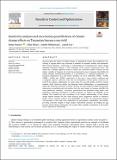Sensitivity analysis and uncertainty quantification of climate change effects on Tanzanian banana crop yield

View/
Date
205-01-09Author
Patrick, Sabas
Mirau, Silas
Mbalawata, Isambi
Leo, Judith
Metadata
Show full item recordAbstract
Concerns about the impact of climate change on agricultural systems have heightened, par
ticularly in regions where crop cultivation is essential for economic stability and sustenance.
This research addresses a critical gap in understanding by investigating how climate change
influences Tanzania’s bananas, a vital component of the country’s agricultural sector. The
study used a multiple regression model to analyze the correlation between bananas and key
climate variables in Tanzania, the results showed gradual decrease in bananas. Specifically, the
climate variables, including precipitation (𝑋1), soil moisture (𝑋2), minimum temperature (𝑋3),
maximum temperature (𝑋4), and relative humidity (𝑋5) have coefficients 0.0206, −0.0085,
4.8328, −1.6594, and −0.0991, respectively. In this case, a large positive coefficient and
a negligible negative coefficient show that the independent variable greatly influences the
yield of the bananas. Additionally, the study utilize two powerful global sensitivity analysis
methods, Sobol’ Sensitivity Indices and Response Surface Methodology, to comprehensively
explore the sensitivity of bananas to climate variables. So, these methods revealed that minimum
temperature, precipitation and soil moisture have the most impact on bananas and affect the
crop’s production variability. Uncertainty quantification was performed using Monte Carlo
simulation, estimating uncertainties in model parameters to enhance the reliability of the
findings. This research not only contributes to our broader understanding of how climate
change impacts bananas but also offers practical policy suggestions tailored to Tanzania’s
unique context, ensuring resilience and sustainability in the face of environmental changes.
The outcomes of this study carry significance for policymakers, stakeholders, and farmers,
providing actionable insights to shape adaptive agricultural strategies. By bridging the gap
between climate change and bananas
URI
https://doi.org/10.1016/j.rico.2025.100519https://dspace.nm-aist.ac.tz/handle/20.500.12479/3008
